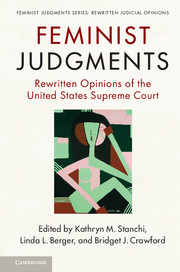Preface
Published online by Cambridge University Press: 05 August 2016
Summary
What would United States Supreme Court opinions look like if key decisions on gender issues were written with a feminist perspective? To begin to answer this question, we brought together a group of scholars and lawyers to rewrite, using feminist reasoning, the most significant U.S. Supreme Court cases on gender from the 1800s to the present day. While feminist legal theory has developed and even thrived within universities, and feminist activists and lawyers are responsible for major changes in the law, feminist reasoning has had a less clear impact on judicial decision making. Doctrines of stare decisis and judicial language of neutrality can operate to obscure structural bias in the law, making it difficult to see what feminism could bring to judicial reasoning.
The twenty-five opinions in this volume demonstrate that judges with feminist viewpoints could have changed the course of the law. The rewritten decisions show that previously accepted judicial outcomes were not necessary or inevitable and demonstrate that feminist reasoning increases the judicial capacity for justice, not only for women but for many other oppressed groups. The remarkable differences evident in the rewritten opinions also open a path for a long overdue discussion of the real impact that judicial diversity has on law and of the influence that perspective has in judging.
- Type
- Chapter
- Information
- Feminist JudgmentsRewritten Opinions of the United States Supreme Court, pp. xxix - xxxPublisher: Cambridge University PressPrint publication year: 2016



